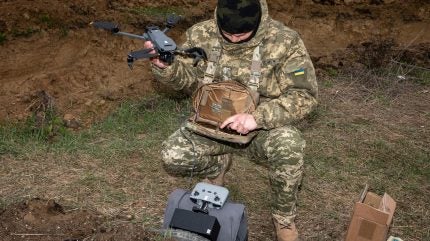
In a show of international solidarity, the Defense Ministers from 12 nations have signed a Memorandum of Understanding (MoU) to formalise the Drone Coalition, an alliance designed to enhance Ukraine’s military through the provision and joint procurement of drones.
This agreement, sealed during the Nato Summit in Washington DC on July 10 2024, emphasises a collective effort to support Ukraine amidst its protracted conflict with Russia.
The Drone Coalition, spearheaded by the UK and Latvia, represents a coordinated initiative to deliver one million First Person View (FPV) drones to Ukraine. Beyond FPV drones, the coalition also commits to supplying an array of reconnaissance, strike, and AI-enhanced drones alongside counter-drone technologies.
The conflict over the past two years has spurred advances in counter-drone technologies. Ukraine and Russia have both employed countermeasures, emphasising the need for cost-effective solutions to counter drones. Ukraine’s use of domestically produced Magura V5 drones to neutralise Russian naval assets underlines the impact of drone technologies in asymmetric warfare. The nature of drone threats necessitates investment in counter-drone technologies to mitigate risks.
GlobalData’s Thematic Intelligence on Drones in Aerospace and Defense highlights that Ukraine’s drone fleet has destroyed crucial Russian supply trucks, delayed the Russian military’s advances, and exposed the Russian army’s vulnerabilities.
“Drones have become an important part of modern warfare and are of great importance for Ukraine to be able to stop Russia’s attacks, primarily on the ground, and to gather information on the battlefield,” stated Sweden’s Defence Minister Pål Jonson, whose country has joined the coalition, contributing prior financial support of €10m ($10.9m) for drone procurement.
Joint procurement
A notable aspect of the coalition’s framework is the establishment of the UK-led Drone Coalition Common Fund, facilitating joint procurement processes. With initial pledges surpassing €45m from coalition members, including the Netherlands, the UK, Latvia, New Zealand, and Sweden, this fund is poised to expedite the delivery of drone technologies to Ukraine’s frontlines.
The UK has initiated an industry competition to develop FPV drones, receiving 265 bids. These proposals are currently under evaluation, with the first contracts anticipated by August. Additionally, Latvia’s provision of a drone testing and training range underlines the coalition’s commitment to continuous technological advancements.
A broadening alliance
While the current coalition includes key Nato members and close allies such as Australia, Canada, Denmark, Estonia, Germany, Lithuania, and Poland, the door remains open for other nations to join this initiative.
The coalition’s inclusive stance highlights a vision for expanding and leveraging global industrial capacities to meet the evolving demands of Ukraine’s defence landscape.
Enhancing Ukrainian capabilities
The coalition’s efforts are not merely confined to drone deliveries. Its concerted focus is on supporting Ukrainian manufacturers and ensuring the sustained efficiency of their drone capabilities. Training programmes and technological support are components of this initiative, enhancing the operational readiness of Ukrainian drone pilots.
Ukraine has ramped up its drone production in response to Russian attacks on its infrastructure and military targets. Despite Russia’s advantage in producing cruise and ballistic missiles, Ukraine has shown strength in manufacturing FPV drones, with reports indicating production reached 200,000 units from January to February 2024.
The formation of the Drone Coalition marks a milestone in international defence cooperation. It reflects a shared recognition of the role that unmanned systems play in the Ukraine-Russia conflict. By pooling resources and funding, coalition members reinforce Ukraine’s defence capabilities.




